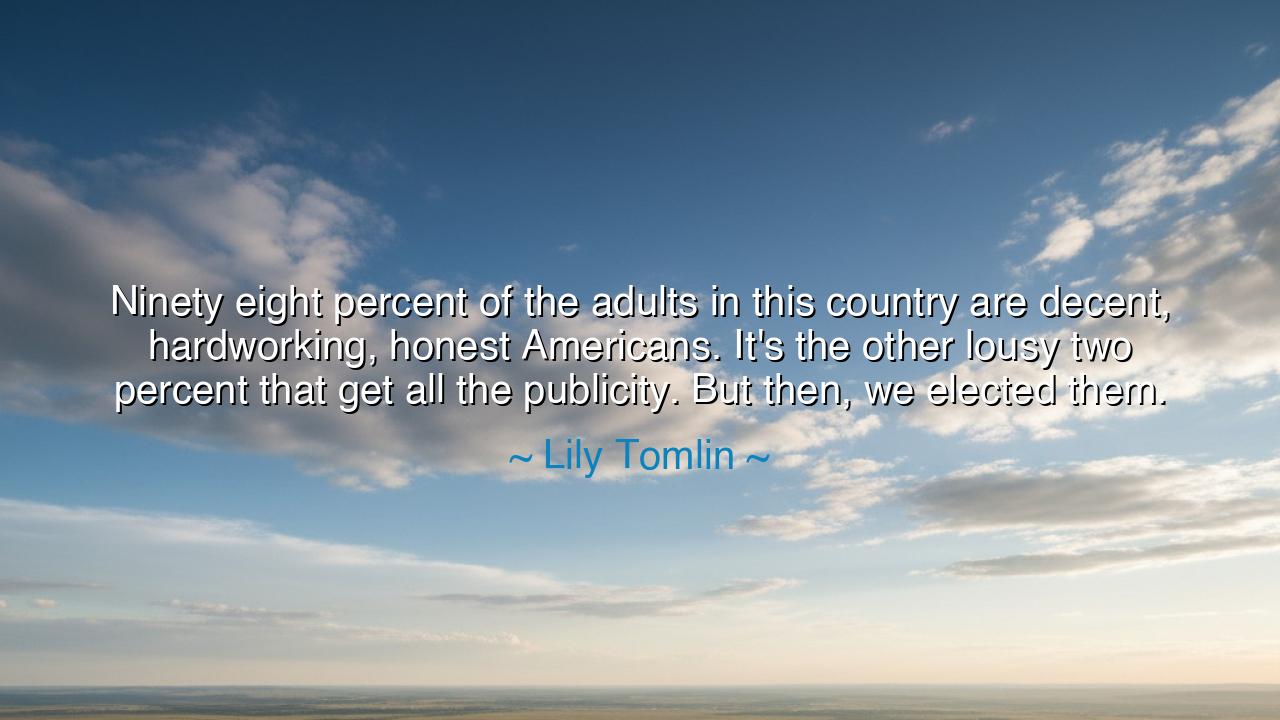
Ninety eight percent of the adults in this country are decent
Ninety eight percent of the adults in this country are decent, hardworking, honest Americans. It's the other lousy two percent that get all the publicity. But then, we elected them.






"Ninety-eight percent of the adults in this country are decent, hardworking, honest Americans. It's the other lousy two percent that get all the publicity. But then, we elected them." Thus spoke Lily Tomlin, the sharp-tongued humorist and philosopher in disguise, whose laughter cuts deeper than sorrow and whose irony often hides the truest wisdom. Beneath the surface of wit, her words reveal a profound meditation on power, responsibility, and the strange bond between the governed and their governors. With this single jest, she exposes both the virtue of the common people and the folly of the political system they sustain.
Tomlin’s observation springs from the world she knew — a world of news cycles and scandals, of political hypocrisy and celebrity worship. She saw that most people live quietly, decent and hardworking, striving each day to build their families, keep their word, and earn their bread. They are the invisible strength of the nation — the ninety-eight percent who ask little but honesty and fairness from those who lead them. Yet, time and again, it is the loud, the corrupt, and the shameless few — the two percent — who fill the airwaves, shape the headlines, and dominate the stage. The irony of her remark is that this minority, whose behavior we condemn, rise to power through the votes, the silence, and the inattention of the very people they betray.
The meaning of her words is not cynical, but cautionary. Tomlin reminds us that democracy, though noble, is fragile — for it reflects not merely the virtue of the people, but their vigilance. When the good become weary and disengaged, when the honest choose comfort over participation, the stage is left to the ambitious and the unscrupulous. In such times, corruption does not seize power; it is invited to it. The publicity of the wicked becomes the punishment of the indifferent. Her jest pierces us because it is a mirror — we laugh at the foolishness of our leaders, but behind that laughter is the uneasy truth that we put them there.
History offers many examples of this pattern, as old as civilization itself. In ancient Athens, the cradle of democracy, citizens once elected demagogues who flattered them with sweet words and promises of prosperity. One such man, Cleon, rose to prominence not by wisdom or virtue, but by feeding the people’s anger and envy. The city that had produced philosophers and poets fell into faction and folly, and its freedom began to decay. So too, in every age, nations have chosen leaders not for their integrity but for their spectacle. The people, weary of dull honesty, often mistake charisma for character — and by the time they realize the difference, the damage is done.
Tomlin’s humor, then, conceals a moral wound. She knows that the “lousy two percent” are not aliens among us — they are the reflection of our neglect, the shadow cast by our own apathy. In democracy, leadership is a mirror, not a crown. When citizens cease to demand accountability, when they mistake mockery for reform and outrage for action, the unworthy ascend by default. The true scandal, Tomlin suggests, is not that corruption exists — it always has — but that the decent majority no longer believes their virtue has political power.
And yet, in her irony there is also hope. If the people can elect the corrupt, they can also elect the righteous. The same hands that raise the unworthy can lift the honorable. The same voices that fall silent in cynicism can speak with power when moved by conscience. Tomlin’s jest, like the riddles of the ancients, contains the seed of awakening: that the fate of any nation lies not in the wicked few, but in the silent many who allow them to rule. Her laughter is not a sneer, but a challenge — a call for the honest to reclaim their voice, for the hardworking to remember their strength.
The lesson is clear and eternal: do not despise politics, for it is merely the reflection of the soul of the people. If the mirror shows corruption, cleanse the heart that stands before it. Be not passive observers, but guardians of your commonwealth. Vote, but also watch; criticize, but also act. Teach your children that leadership is not entertainment, but duty; not power, but service. Let decency no longer be silent, and the two percent will no longer define the whole.
So remember the wit and wisdom of Lily Tomlin, who turned laughter into a sword of truth. Her jest reminds us that democracy is not a spectator’s sport, nor a tale of villains alone. The ninety-eight percent, the decent and the honest, are not powerless — they are the foundation of all that endures. Let them awaken, and the noise of corruption will fade like a shadow before dawn. For in the end, the government we elect is the government we deserve — and the government we deserve can yet be noble, if we, the people, dare once more to be wise.






AAdministratorAdministrator
Welcome, honored guests. Please leave a comment, we will respond soon